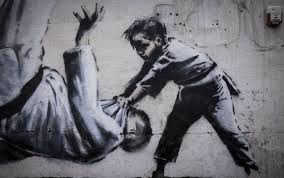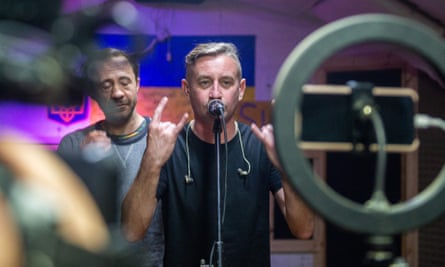 |
| Banksy |
For Ukrainians, poetry isn’t a luxury, it’s a necessity during war
Friday 9 December 2022
“There is so much poetry coming out of Ukraine now that I’m barely keeping up with it,” the Ukrainian translator and scholar Oksana Maksymchuk tells me. It is hardly the first thing that one would expect of a country at war. But poetry’s ability to, as she says, “crystallise a particular moment in time, or an emotion that is fleeting”, has led to an outpouring of poems – not so much emotion recollected in tranquillity, as the spontaneous overflow of powerful feelings. Often these poems are posted by their authors on social media; the literary journal
 |
| Banksy |
It is true that when Russia’s full-scale invasion started on 24 February, literature was the last thing on people’s minds – “you could not protect your family from a rifle with your poems”, as the writer Oleksandr Mykhed put it. But as the conflict has continued, the power of writing to record, to testify and to witness has seemed more and more important. Many Ukrainians started to keep diaries, the “first responder”, perhaps, among literary genres, able to gather experience and emotion in its rawest form. But in surprising numbers, Ukrainians are also turning to poetry, while setting aside for the time being that time-greedy literary form, the novel. “It’s the condensation, the density of it, the way that you can arrange words so that they carry a lot,” explains Max Rosochinsky who, with Maksymchuk, is co-editor of an anthology of Ukrainian poems, Words for War, born from the conflict that began in 2014 with Russian annexations in the Donbas and Crimea.
Some poets, during the current full-scale invasion, have found themselves harnessing their words to song, attracted to the direct catchiness of lyrics. Lyuba Yakimchuk, for example, has collaborated on an album called Ukrainian Songs of Love and Hate – a collection of sarcastic, pitch-dark pop songs, one of them titled, uncompromisingly, I Have a Dream (Moscow’s Burning). Another leading Ukrainian poet, Serhiy Zhadan, was posting poems on his Facebook page right up until the invasion in February; lately, though, his most prominent output has been with his ska band Zhadan i Sobaky (Zhadan and the Dogs), including a song, Metro, that reflects the experience of spending nights sheltering from missile attacks in a Kharkiv underground station.

Daryna Gladun, a poet based in Bucha before the invasion, has written that the work she is producing at the moment “sits at the boundary between literature and journalism. It is poetry in uniform. I set aside metaphors to speak about the war in clear words.” It interests me that she uses metaphor to describe this process at the same time as apparently eschewing it: in the end, metaphor will out. If war involves a fracturing of language, it is poetry that will eventually creep in to fill the gaps.
One poet, Lesyk Panasiuk, has produced a poem (translated into English by Ilya Kaminsky and Katie Farris) that embodies the idea of the rupture of language through the physical collapse of signs and lettering on buildings hit by missiles. In the Hospital Rooms of My Country refers to “sentences that are blown by the mines in the avenues, stories/ shelled by multiple rocket launches”.
The novelist Victoria Amelina has turned for the moment from fiction to poems because the time is not right for novels, yet; as she writes in one poem, the new “war reality” is “devouring plot coherence”. Titled No Poetry, it expresses anxiety about its own status as literature, when there are more urgent tasks at hand than writing poems. “As if shells hit language/ the debris from language/ may look like poems/ But they are not/ This is no poetry too/ Poetry is in Kharkiv/ volunteering for the army.”
The rupture of language – inextricable from the violent rupture of “normality” for Ukrainians – has one starting point in war’s euphemisms and lies. According to Vladimir Putin, for example, the invasion is not really an invasion, but a “special military operation”. When explosions are reported in the Russian media, they are often referred to as “claps”, like the innocuous clapping of hands. But for a slight difference in pronunciation, the Russian word for clap, chlopok, is identical to the Russian word for cotton. The Ukrainians have started facetiously using their own word for cotton, bavovna, for such explosions; at the same time, a cloud of fluffy cotton fibre might remind you of smoke from a missile strike. That kind of wordplay is already on a path towards the poetic; one of Yakimchuk and co’s songs, indeed, is a dark lullaby based on that very slippage of meaning.
Poets, word-watchers par excellence, are watching meaning shifting its ground daily during this invasion. Yakimchuk, when we met in a Kyiv cafe, told me how in this time of war, she has watched the old symbolic systems no longer functioning, the usual cliches failing. You can’t say something’s “going nuclear” when nuclear missiles are an actual possibility, she says. Simple, everyday words suddenly come with a different weight. Take the word “light”, for example. “I used to think of light as something that brought clarity. Then, after the invasion, we had to dim our lights at night, we masked our light,” she says – she is speaking of urban blackouts. Now, though, “we have a totally different situation with electricity and attacks on energy infrastructure. Light has become more precious and valuable.” Light – and all its attendant metaphors – has indeed become something that might be extinguished without warning.
Ostap Slyvynsky, a poet and translator based in Lviv, describes how Ukrainians have found themselves reaching back into history to find words capable of describing their situation. Gauleiter, the word for the German officials who governed conquered areas during the second world war, has sprung back into use to describe those administering Russian-occupied areas of Ukraine.
At the beginning of the war, Slyvynsky eschewed writing in favour of volunteering at Lviv railway station. Handing out hot drinks and food to those fleeing from the east, though, he soon discovered that the refugees had another human need: to tell their stories. Their tales of loss, dislocation and escape often turned on the way a once familiar word had transformed its significance. He began working on what he calls a Dictionary of War, charting these metamorphoses through short stories or vignettes. “It is pure documentary,” he says. “There is nothing imagined, nothing fictionalised, nothing created by me in this text, but there came a moment when I understood that this was also poetry.” Ukrainian writers often tell me that now is not the time for literary experimentation, but rather for directness and documentary. What is clear, though, is that they are experimenting almost despite themselves, as they edge towards the impossible task of expressing the inexpressible.



No comments:
Post a Comment